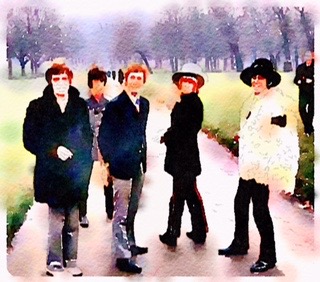
Throughout their career, the Rolling Stones were a conspicuous (and often deliberate) contrast to the Beatles, going against the grain of conventional behaviour expected both within the music industry and outside in the world at large. And as the world reacted with outrage and alarm to the long hair and surly derision of the Stones,the group learned the truth of the show business adage, “any publicity is good publicity”. The more the establishment expressed its disapproval, the larger became the army of the group’s ardent supporters. Of all the British groups who had. reason to thank the Beatles for opening up the world as a market, the Rolling Stones made the most of the opportunities; step-by-step, blow-by-blow, they followed each move of the Beatles With a complementary response: hard, heavy, and dark, where the Beatles were soft and light. The Rolling Stones gave a savage twist to the blues and soul music that provided their musical inspiration. Selfish, spiteful, and sexually threatening,they stirred subliminal feelings that popular music normally preferred to leave alone, but which in black music had always been closer to the surface. (Charlie Gillett, The Sound of the City: The Rise of Rock and Roll, p. 268)
Until Goats Head Soup, Essential. Thereafter, mileages will vary. File under: Rocking Institutions
Discography: Studio albums 1964-74 1976-Present Live albums 1968-2008 2011-Present Compilations 1966-80
1981-Present Other albums; Box Sets; Extended Plays
In the music library: Aftermath Beggars Banquet Exile On Main Street Ladies & Gentlemen (Live) Let It Bleed
The Rolling Stones Singles Collection: The London Years Sticky Fingers
Links: Wikipedia Official web site Twitter Facebook AllMusic Discography at Discogs The Guardian
Biography.com YouTube The Official Rolling Stones Archive
50 Years of concerts of The Rolling Stones Rolling Stones: 25 defining moments in their career